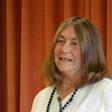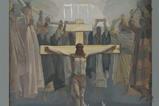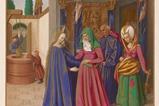Elaine Storkey explains Her Majesty’s role as ‘head’ of the Church of England, and reflects on how diligently she undertook it
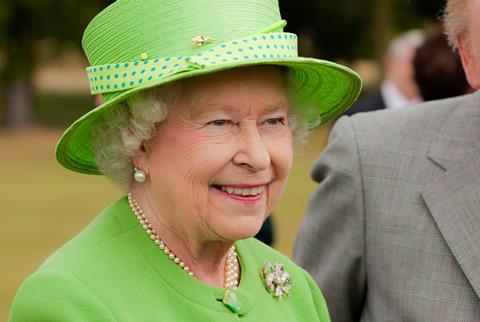
People often expressed surprise when they heard that Queen Elizabeth was the ‘head’ of the Church of England. “Surely not?” was usually the response: “The head of the Church is Jesus Christ.” And of course that is entirely true. St Paul affirms this in his letter to the church at Colossae (Colossians 1:18), and all Christians recognise it. The Queen was only ‘head’ of the Church of England in a constitutional sense. So I want to take a few minutes to reflect on what this means and how the Queen lived out that role.
In Britain the monarch is the Head of State and reigns over the country. But our constitutional monarchy means the roles and authority are defined by the constitution. Nobody in the country has absolute power. As monarch, Queen Elizabeth was the ‘head’ of the legislature, the armed forces, the judicial system and other institutions as well as the Church. But Elizabeth did not, of course, run the nation or the military.
She delegated her authority to other people. The government runs the country, acting on the authority of the monarch and elected by the people. All this offers so many safeguards to a nation. Having the monarch as commander in chief of the armed forces, for example, the constitution makes sure nobody else can take over power and make military decisions affecting the lives of millions.
So, as ‘head’ of the Church of England, Queen Elizabeth did not run the Church or decide its doctrines. Those are already laid down in the historical creeds and documents of the Church, upheld by the bishops and clergy. Yet Christianity is woven into the identity of the sovereign and even defines what a monarch does.
The importance of faith to the monarchy
We saw all this in the Queen’s Coronation in 1953. Church and state came together in the interlocking of her roles. The Queen was crowned as Head of State and the Commonwealth. The Coronation took place in a Church of England building – Westminster Abbey.
It was surrounded by prayer and worship. The Queen was anointed for office by the Archbishop of Canterbury, the Church’s most senior clergyman. She took a Coronation oath, promising to reign with justice and mercy and to do everything in her power to “maintain the Laws of God and the true profession of the Gospel”. She also promised to preserve the “doctrine, worship, discipline and government” of the Church of England.
We soon found that these were no idle promises. From the very beginning the Queen didn’t regard them just as part of ritual but took them very seriously. For the whole of her reign, these promises shaped her role. Even more than that, we saw how close they were to her own heart.
In all the obituaries offered by people across the realm, one key point has echoed again and again: the Queen’s strong personal faith in Jesus Christ and her commitment to his teachings in the New Testament. These defined for her the calling to be queen. We have been blessed to have a firm Christian and woman of prayer as our monarch.
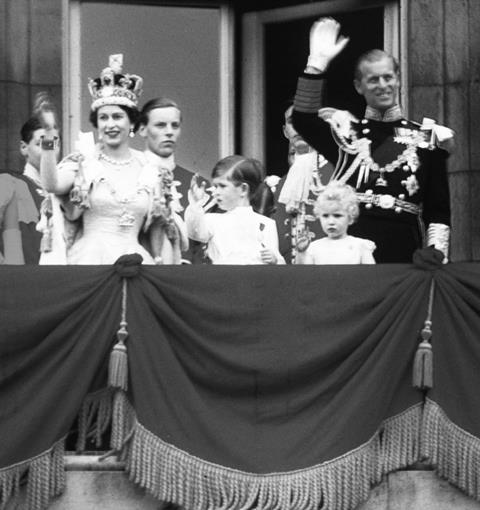 Royal Party on Buckingham Palace balcony after Queen Elizabeth II Coronation, 2 June 1953
Royal Party on Buckingham Palace balcony after Queen Elizabeth II Coronation, 2 June 1953
Experiencing the Queen’s encouragement
I saw this first hand when I was a member of the Church of England’s parliament, the General Synod, which is elected by church members. The monarch’s authority is delegated to this parliament, as well as to state parliament. I was on the Synod for 28 years and, every five years, a new session of Synod was opened by the Queen.
She would come with Prince Philip and sometimes other members of her family, to join opening worship before addressing the newly elected Synod. For all of us, the Queen’s visits were a highlight. It might have seemed just another occasion of British pomp, with everyone robed up in their finery.
Yet, beneath the ceremony, the Queen’s messages were full of faith. Her words were always gentle and delivered with compassion, rooted in scripture.
I found she so clearly understood the challenges the Church faced, and the issues we would have to deal with in the years ahead. In her message in 2010, she wanted to encourage us with words from St Paul:
“St Paul’s encouragement to the Ephesian church (was) to ‘lead a life worthy of the calling to which you have been called, with all humility and gentleness, with patience, bearing with one another in love, making every effort to maintain the unity of the Spirit in the bond of peace.’
“Archbishops and members of the Synod, the five years ahead will not always be straightforward. But I am confident that with the encouragement of these words of St Paul and the certainty of the love of God, you will find the strength and the vision to work together to succeed.
May the Lord’s blessing be on you as you embark on your important deliberations.”
A consistent witness
Eleven years later, and now 95, her message to the Synod in 2021 was particularly poignant as the country battled with the COVID pandemic and faced the consequences of lockdown. The Queen herself had been bereaved and was unwell.
For the first time in over 50 years she was unable to open the Synod sessions and Prince Edward came in her place. But her own words still stood out, passing on a reminder of what the Church is about and what we had to battle with:
“One (task) stand out supreme: to bring the people of this country to the knowledge and love of God.
“For people of faith, the last few years have been particularly hard, with unprecedented restrictions in accessing the comfort and reassurance of public worship. For many, it has been a time of anxiety, of grief, and of weariness. Yet the Gospel has brought hope, as it has done throughout the ages; and the Church has adapted and continued its ministry.”
The Queen was in every way a person who spoke into the situation of the nation itself and, even as the culture changed, her persistent Christian witness did not falter. She had so little personal ego, never needing to draw attention to herself or her workload.
She quickly brushed off adulation from people, and always focused on the bigger picture. Her Christmas messages in particular conveyed the personal faith that kept her going. I’ve chosen two from 2011 and 2012, which demonstrate so well her understanding of the uniqueness of Christ as Saviour, and the response we should make to him. For Queen Elizabeth was not only a believer; she was also an evangelist.
“Although we are capable of great acts of kindness, history teaches us that we sometimes need saving from ourselves – from our recklessness or our greed. God sent into the world a unique person – neither a philosopher nor a general, important though they are, but a Saviour, with the power to forgive…It is my prayer that on this Christmas day we might all find room in our lives for the message of the angels and for the love of God through Christ our Lord.
“This is the time of year when we remember that God sent his only son ‘to serve, not to be served’. He restored love and service to the centre of our lives in the person of Jesus Christ.
It is my prayer this Christmas Day that his example and teaching will continue to bring people together to give the best of themselves in the service of others. The carol, ‘In the Bleak Midwinter’, ends by asking a question of all of us who know the Christmas story, of how God gave himself to us in humble service: ‘What can I give him, poor as I am? If I were a shepherd, I would bring a lamb; if I were a wise man, I would do my part.’ The carol gives the answer: ‘Yet what I can I give him – give my heart.’”
I want to close with her one Easter message delivered to the people, in the pandemic of 2020.
“As darkness falls on the Saturday before Easter Day, many Christians would normally light candles together. In church, one light would pass to another, spreading slowly and then more rapidly as more candles are lit. It’s a way of showing how the good news of Christ’s resurrection has been passed on from the first Easter by every generation until now.
“This year, Easter will be different for many of us: by keeping apart we keep others safe. Yet Easter isn’t cancelled; indeed, we need Easter as much as ever. The discovery of the risen Christ on the first Easter Day gave his followers new hope and fresh purpose, and we can all take heart from this.
We know that Coronavirus will not overcome us. As dark as death might be, particularly for those suffering with grief — light and life are greater. May the living flame of the Easter hope be our steady guide as we face the future.”
May our faithful servant Queen know the full reality of that, now home with her risen Lord.
Elaine Storkey is a lecturer, writer and broadcaster. Her latest book is Women in a Patriarchal World (SPCK).
